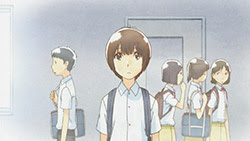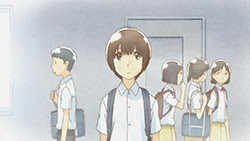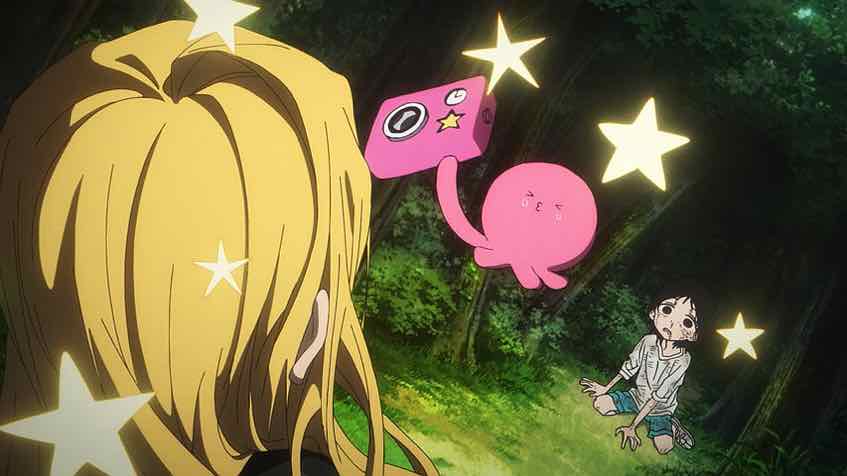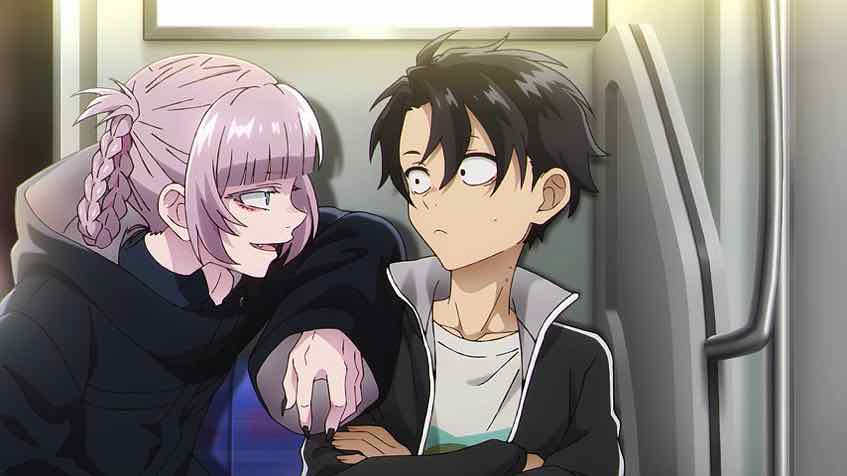To get the mechanics of the situation out of the way, as I understand it this was a “compilation” of episodes 10 and 11, with full unedited versions of both to air on the DVDs. I don’t quite understand, but it may have something to do with the earthquake or other production delays. In any case, what we see next week may either be episode 12 – which may or may not have been the planned DVD bonus episode – or another compilation of episodes 11 and 12. Whichever, it will definitely (sob) be the last TV episode.
That makes the staggering quality of this episode all the more remarkable. In no way did it feel disjointed or cobbled together – it was another magnificent offering from the best series of the year so far. In some way I guess it should bother me more that this show isn’t popular, but I guess I’m just used to great series never finding mass audiences.
Those who felt annoyance that the kids in Shuichi’s life didn’t torture him enough should take some comfort in the tone of the episode this week. In short and not surprisingly, the shit really hit the fan after Shu’s dress-up disaster last week. Chi is fully supportive, naturally – trying as usual to make things better by talking her way through the crisis. But it’s Momo who shows her true stripes. She urges Chi to throw Shu under the bus, telling her she’s be tagged a freak if she hangs out with him. Her response is true to character – she tells Momo that she’s a freak too. But Momo just drives the knife further into Shu’s back, arguing that he’s a much bigger freak and dragging Chi away.

It’s no better with the rest of the kids outside Shu’s support group. The snickering and the name-calling is endless, and they even lock the door against his entering the classroom. Shu ends up taking shelter in the nurse’s office. It’s a blessing that he has friends to support him because things would be intolerable otherwise, but it’s still heartbreaking to see what he has to go through. The instigator Doi pointedly ignores him in the hallway and doesn’t say a word in his defense, and his parents – though not angry – are reduced to helpless stammering ineptitude and self-doubt. Shu isn’t getting much help from his family, that’s for sure, and the double-standard he faces is only too obvious to all concerned – especially Yoshino. As for Anna, she breaks off their relationship in as kind a way as she can – she clearly cares for Shu and hates the idea of him being hurt, but this is all too much for her to deal with. In a way, I really can’t blame her.
If there’s anything that’s galling to me (but alas, very much true to my memories of the middle school years) it’s how inept all the adults are at providing any kind of support and protection for the vulnerable Shu. Other than Yuki none of them can grasp the situation and do anything to help – including the homeroom teacher, who again reveals himself to be a kind-hearted screw-up. He sits idly by and lets Doi goad the class into holding another gender-bender play for the culture festival, despite the obvious dangers inherent in the situation for Shu. Maybe this will actually prove to be a positive in the end – they end up using Shu’s original play from grade 7 – but if so, it will have been a happy accident.
In the end, more than anything, this is a series about Shu’s growth and his journey, so it’s fitting that the focus is most squarely on him as we enter the final stages. He’s a heartrendingly kind and smart kid, but so naive about the world around him. But he shows strength at this terrible moment, not lashing out or dissolving into self-pity. Having seen the terribly unfair nature of his reality as opposed to Yoshino’s, he resolves never to dress up as a girl to be laughed at again. He musters his courage and tells Doi what he thinks of him. He even starts to grow his hair out, much as Yoshino did – perhaps as a defiant gesture. And he agrees to direct his play, which seems to win him back a tiny measure of social acceptance from his class.
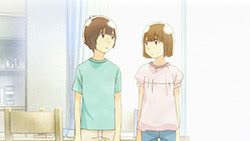
Ultimately, what makes a great series for me is one that makes you feel something strongly. This one meets and exceeds that standard. It would take a cold, cold heart not to want to take these kids in your arms and protect them, let them know everything is going to be OK – especially Shu. Problem is, of course, it probably won’t be – they’re all in for a rough time of it just being adolescents, but for Shu the way forward is clouded indeed. Whatever path he chooses is going to be a minefield of pain and confusion and self-doubt, and all through no choosing of his own. The ED is always a relief because it’s so bright and full of hope, showing Shu happy and full of life – and it’s not insignificant that the last shot is of him looking up and seeing Yoshino. They’re the center of this universe, and they’re the one thing that stands between the other and misery even at the worst of times. It seems to me that they always look to each other at their darkest moments, wanting to know that there’s at least one person who understands and accepts them unconditionally. So any conclusion that doesn’t find them together will feel unsatisfying to me on some level, at least – though given the limits of the anime’s format it would be understandable. I have full faith and confidence that the staff will find the right place the leave this story, much as they found the right place to enter it.


